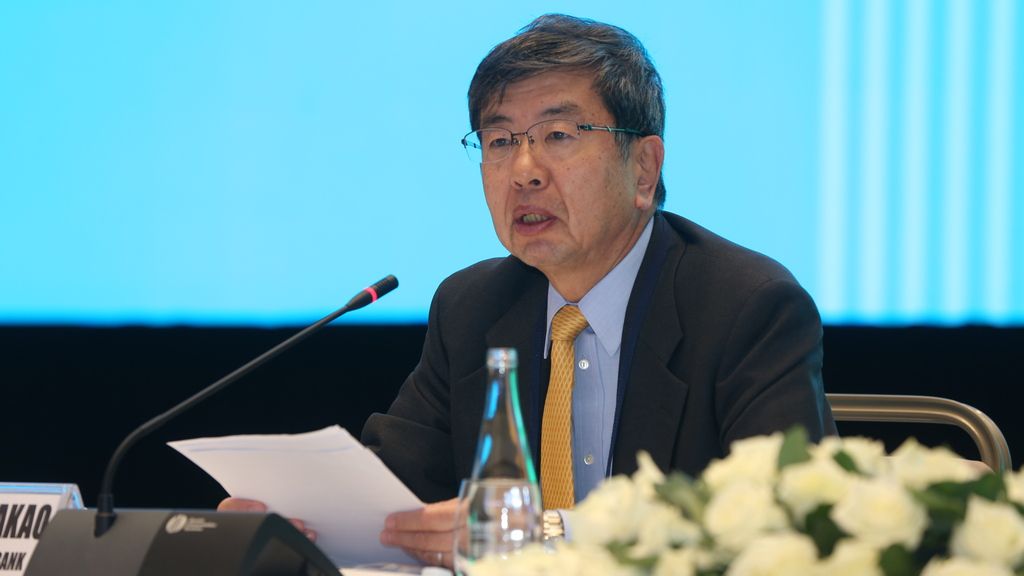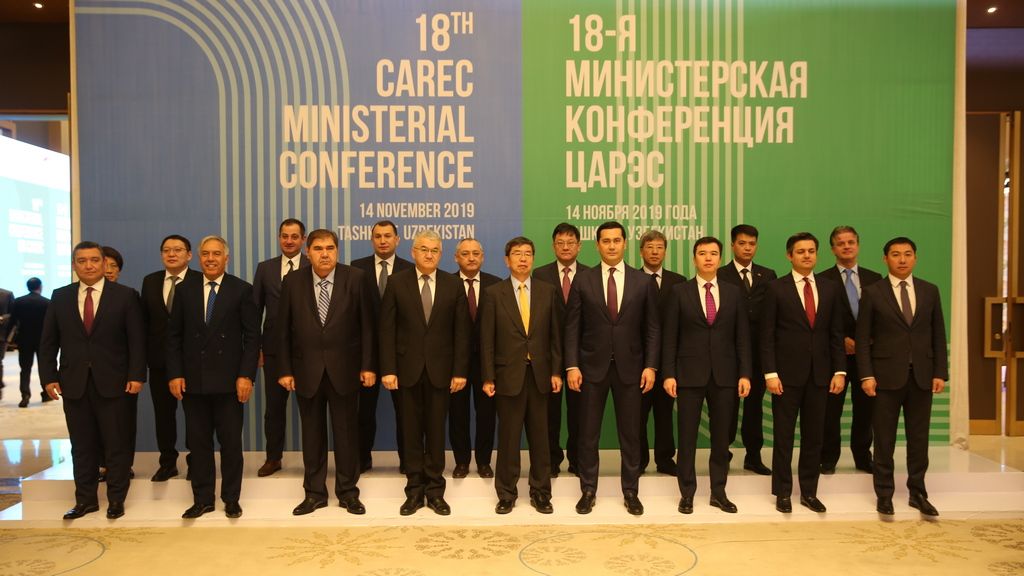Elvira Kadyrova
“Under Strategy 2030, ADB will enhance connectivity and competitiveness, promote regional public goods, strengthen cooperation in the financial sector, and support subregional initiatives such as CAREC”, stated President of Asian Development Bank Takehiko Nakao during his opening address Thursday (14 Nov) at the 18th CAREC Ministerial Conference Cooperation in Tashkent.

He emphasized that that good progress is being made in the implementation of the CAREC 2030 strategy and the new operational areas identified as priorities in CAREC 2030.
First, more macroeconomic policy dialogue is being undertaken to debate key issues and challenges faced by CAREC countries. ADB, the International Monetary Fund, and the World Bank co-organized a high-level forum on “Balancing Infrastructure Investments with Debt Sustainability” in Nur-Sultan in May 2019. This CAREC forum attracted central bank governors and finance ministries’ officials. In Islamabad, in August, we brought together capital market regulators and private sector stakeholders from CAREC countries for the first time to discuss experiences in reforming capital markets.
Second, in a high-level policy dialogue in the energy sector, CAREC Energy Ministers met for the first time in Tashkent in September. The Ministers signed a declaration to work together to promote reforms in the energy sector and energy security in the region.
Third, a high-level forum on “Sustainable Tourism Development in the CAREC Region” was held during ADB’s Annual Meeting in Fiji this year. Discussions focused on the need for a regional approach to sustainable tourism development. A regional tourism strategy and a pipeline of tourism sector projects are being developed.
Fourth, in the agricultural sector, to support regional agricultural value-chains, ADB has prepared masterplans for logistics centers for wholesale markets in Kazakhstan and the Kyrgyz Republic. Sanitary and phytosanitary standards are being upgraded. Work has begun to identify challenges and opportunities in regional cooperation in the water sector. Cooperation in the water sector benefits both irrigation and drinking water in the region.
Fifth, regarding education, a study on regional cooperation in education has been completed, identifying opportunities for harmonization of standards and establishing a labor market information system. These will help promote the exchange of students and faculty members between countries and better access to jobs for students in the region.
Sixth, ADB will continue to deepen support for trade and connectivity. Under the CAREC Integrated Trade Agenda 2030, ADB is supporting implementation of trade-related reforms. This includes improving and digitizing customs services, and policy and regulatory frameworks for e-commerce and services sectors.
Seventh, ADB is preparing new region-wide financing facilities. US $2 million-worth technical assistance project will prepare a regional disaster risk financing facility to develop insurance mechanisms for member countries to hedge against earthquake and flood-related risks. This regional disaster risk financing facility will increase market size by pooling risks faced by member countries. It will attract private insurers to the region and bring down insurance premiums. A $2.3 million technical assistance project is preparing a trade credit and investment guarantee facility, which will support exporters and importers in the region by providing guarantees to financial institutions for extending credits to exporters and importers.
ADB chief also has pointed some figures, demonstrating economic and trade outlook of the CAREC region.
Growth in the CAREC region, excluding the PRC, accelerated to 4.9% in 2018 from 4.6% in 2017 thanks to stronger public investment in Azerbaijan, Pakistan and Uzbekistan. However, growth in 2019 is expected to slow to 3.9%, as Pakistan enters a stabilization phase, and a slowdown in oil production slows expansion in Kazakhstan. Azerbaijan, the Kyrgyz Republic, and Uzbekistan are expected to post higher growth in 2019.
Merchandise trade in the CAREC region (excluding the PRC) posted a strong 13.1% growth in 2018. Improved trade performance was underpinned by higher hydrocarbon prices and increased demand for gas from the PRC. However, trade growth was 6.4% year-on-year in the first half of 2019.
Ongoing trade tensions, uncertainties surrounding Brexit, and the softening of growth in the PRC are affecting global and regional trade. But we remain optimistic about the medium-term trade prospects for the CAREC region. Uzbekistan’s efforts to accede to the WTO, liberalization of visa regimes in various CAREC countries, improvements in connectivity, and reduction in non-tariff barriers should all promote trade going forward.
The theme for this year’s ministerial conference is “A new CAREC—Expanding Horizons of Regional Cooperation.” The high-level gathering discussed the new CAREC Transport and Energy strategies, pace of implementation of CAREC 2030. The public-private dialogue on promoting sustainable tourism development in the CAREC region through public–private partnerships was held on the sidelines of the conference.

The Tashkent event was last CAREC ministerial conference for Mr.Takehiko Nakao as President of ADB. He will resign in January 2020. Concluding address, he thanked all development partners and minsters from CAREC countries and cited great Central Asian poet Alisher Navoyi: “The greatest curse is for all humankind is hostility, the greatest blessing is friendship among neighbors.”
About CAREC
The Central Asia Regional Economic Cooperation (CAREC) Program is a partnership of 11 countries and development partners working together to promote development through cooperation, leading to accelerated economic growth and poverty reduction. It is guided by the overarching vision of “Good Neighbors, Good Partners, and Good Prospects.”
Since its launch in 2001 and as of today, the CAREC Program has invested US $37 billion into 200 projects in transport, energy, and trade. US $14 billion of this has been financed by ADB. /// nCa, 15 November 2019
Official website of CAREC: https://www.carecprogram.org/